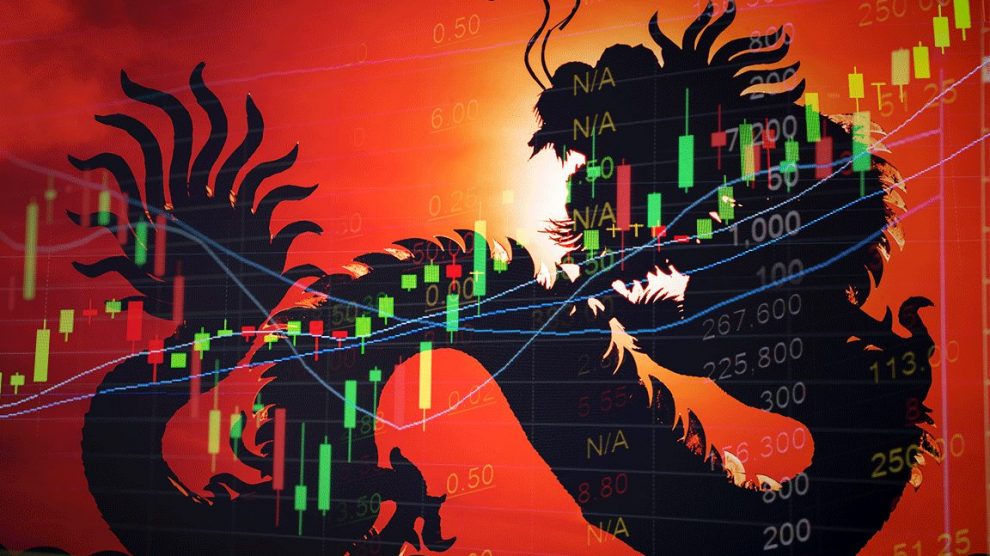The sudden collapse of the talks between North Korean dictator Kim Jong Un and U.S. President Donald Trump is embarrassing. It raises serious doubts that the United States will be able to achieve anything in its negotiations with China on trade, either, despite the president’s assurances those talks are going great.
China’s markets continue to be some of the strongest performers this year. They’ve just been boosted by MSCI’s decision to quadruple the weighting it gives to Chinese stocks. That gives a structural underpinning to the bull rally underway.
The CSI 300 benchmark of the broadest range of listings in Shanghai and Shenzhen climbed 2.2% on Friday, thanks to a rally when confirmation of MSCI’s change came before the start of trade. Chinese markets haven’t been hit by the breakdown in communications in Hanoi, and are now up 24.6% this year, but maybe they should be.
For all Trump’s talk, I’m not sure how concrete any agreement with China will be. U.S. Trade Representative Robert Lighthizer has been far less encouraging in describing the talks and possible results. U.S. negotiators are pushing for structural reform of China’s economy, and an air-tight manner of enforcing any agreement, and China will do its very best to avoid either outcome.
Yet Chinese nationalists are adamant that the country should not “cave” to U.S. pressure. Vice premier Liu He, who headed the negotiating team that met with Trump, has already come under fire at home for making concessions to the United States, although of course no details of any deal are yet agreed.
China is also frustrated that its initial choice of location for the next Xi-Trump summit, Hainan Island, has been nixed. The two leaders will meet again at Trump’s Mar-a-Lago golf resort in Florida, Trump says, “probably” in March. That would be close to two years since they first met there soon after Trump took office.
That’s also imperfect timing, since China’s parliament, the National People’s Congress, will begin its annual meeting on March 5. Although it’s a rubber-stamp body, Xi will want to be present and use the pageantry to push his agenda. He doesn’t want to be trumped by rushing off to talk to Trump.
It’s clear that Chinese investors, who dominate 85% of mainland trading, are enthused by the prospects of trade peace. Momentum traders and speculators hold sway over mainland stocks. They’ve provoked a relief rally all year. But their influence will wane, with institutional investors forced to buy Chinese shares if they’re going to track the MSCI Emerging Markets Index, which now includes China stocks.
This promises to bring as much as US$80 billion of inflows from international investors into China’s markets. It will be “sticky” money for the most part, institutional and based on funds linked to the MSCI Emerging Market Index.
Technically, MSCI only includes Chinese stocks in that index at 5% of their actual market capitalization, because it is exceptionally hard for foreign investors to buy mainland stocks. They’re really only able to do so only through the Stock Connect programs linking Hong Kong with Shenzhen and Shanghai.
MSCI will now boost that “inclusion factor” to 20% of their actual value in three steps of 5%, with revisions in May, August and November. It will also gradually include large caps on ChiNext, the wannabe-Nasdaq board in Shenzhen, starting in May. As of the November review, the index provider will start including Chinese mid-cap stocks.
This infusion of cash is guaranteed, and big money. Investors should put more stock in MSCI’s inclusion, and the fact that global investors will have to include Chinese stocks in their portfolio, than any optimistic outcome of the trade talks. Trump’s optimism was misplaced in Hanoi, and it may be once again with China, too.
The White House had penciled into the schedule a “signing ceremony” at the end of talks with North Korea. But the president ends up having flown half the world away for a second face-to-face with the leader of an outcast and frankly crazy nation only to come away with nothing.
Kim is validated as a world leader by his audience with the “leader of the free world.” Not that Kim will be rejoicing the outcome, either. He doesn’t have a lot of options.
North Korea’s foreign minister, Ri Yong-ho has contradicted Trump’s version of events. North Korea claims it asked only for some sanctions to be lifted in reaction to North Korea’s promise to dismantle its main nuclear reactor.
“Given the current level of trust between North Korea and the United States, this was the maximum step for denuclearization we could offer,” Ri said at a press conference, according to The New York Times. “This kind of opportunity may never come again.”
Now after Trump’s promise of a “signing summit” with Xi, U.S. negotiators are again under pressure to come up with something that will appeal to both sides.
Robbed of his nuclear deal, Trump is now even more desperate of a win over trade with China than he was before he met Kim. I’m betting the U.S. president pushes a deal through quickly that includes simple trade purchases by China, of agricultural and energy products, rather than any reform of its state-supported industries or rules that place foreign companies at a disadvantage.
Lighthizer says the “all-important issue” is enforceability, and he’s right. China agrees to plenty of pacts that it has no intention of honoring, and when it does, it changes the rules.
“Don’t go for the soybean solution,” Lighthizer told Congress. “This is our one chance.”
We’re into March already, meaning negotiators are scurrying to make progress. Their president is likely to override their best advice to push some piece of paper through. So I’m afraid now that soybeans, rather than a progressive pact advancing China’s economy, is exactly what Trump is going to get.
The article "China's Bull Market Has Structural Support Despite Hanoi Scare on Trade - RealMoney" was originally published on https://realmoney.thestreet.com/investing/china-s-bull-market-has-structural-support-despite-hanoi-scare-on-trade-14883244




